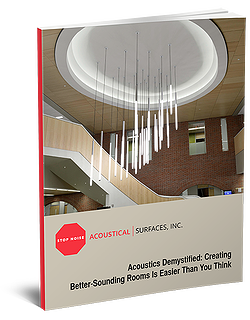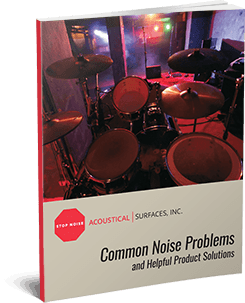A Guide to Acoustic Flooring: Commercial and Industry
There are so many options out there when it comes to industrial and commercial sound absorbing flooring, deciding on what material is best for your business can feel overwhelming. When you are redesigning a space, it can be tough to visualize the space with a new look. Not only are you looking for something that will be aesthetically pleasing for years to come, but you need something that can handle the wear and tear of the business you’re in.
Wood flooring with an acoustic underlayment is a beautiful example of sound absorbing flooring, but it’s probably an unsuitable choice for something like an auto shop or a warehouse. Be sure to find a nice balance between beauty and functionality.
Industrial flooring options
When browsing industrial flooring options, there are several things to consider. First and foremost is always design. Your selection will hopefully last for decades, so choosing something with a timeless look that fits your brand tops the list.
You’ll also need to account for what your flooring is going to have to endure. Softer materials won’t hold up to abuse the way harder materials will. On the other hand, softer, more porous materials will help absorb both impact sounds and the ambient sounds in the room.
Reducing the noise pollution
Finding ways to reduce noise pollution is a great way to keep employees happy and productive, so sound absorbing commercial flooring is a solid investment. At the end of it all, your new flooring will also need to come in at a price you can live with.
Knowing the pros and cons of each type of industrial flooring goes a long way toward informing your decision. You can almost certainly find a flooring option that fits your style and budget if you know where to look. Let’s dive into a few options.
What is the best sound-absorbing flooring?
If noise reduction is your number one concern, then carpet may be a good choice. Carpeting pulls double duty in the sound reduction world, making it one of the best soundproofing flooring options on the market.
First, it reduces sounds caused by impact. The noise caused by people walking or machines vibrating may seem like minor disturbances, but when added together, they can create a soundscape designed for distraction.
Carpet also absorbs sound fairly well. Industries like schools, libraries, and hotels that rely on quiet spaces often opt for sound deadening flooring like carpeting or carpet tiles.
How can I soundproof my floors cheaply?
The cheapest route to achieve some level of sound reduction would be to put some rugs down. Adding some high pile rugs to open spaces and runners to high traffic areas will cut down on impact noise and may even absorb some of the sounds in the room.
If you are looking for sound absorbing flooring that is capable of being wiped down and cleaned up easily, you can go with interlocking floor mats. These mats are available in many different styles and textures and are generally made of antibacterial materials. They can be easily cut to fit your room and help bring the sound in the room down quite a bit. However, they aren’t always ideal for high traffic areas. They work best in places like gyms, garages, and sound studios.
If you have a slightly larger budget and want a little more bang for your buck, you can use Green Glue to adhere secondary flooring material directly to the top of your existing flooring. Using Green Glue means you don’t need to remove the existing flooring, and gives you an additional layer of sound insulation.
Is vinyl flooring good for soundproofing?
If you want a smooth, easy to clean surface that comes with interlocking floor mats, and want to cover a larger area and accommodate higher foot traffic, vinyl commercial flooring is a good option. Like most things, you’ll get the best effect by purchasing quality vinyl.
Your best bet is to choose a foam-backed vinyl or install an acoustic underlayment before putting the vinyl down. The vinyl will muffle the impact sounds associated with people working on it, and it will also absorb some of the ambient sounds in the room. Industrial vinyl flooring is a perfect choice when your space is especially busy.
What is the quietest flooring?
When it comes to flooring, there is a wide spectrum between the quietest and noisiest. If you are looking for the quietest flooring for your specific application, you need to determine what kinds of materials will and won’t work.
Carpet is a great sound insulator, but won’t work in lots of industrial settings. Cork flooring is also fantastic for absorbing sounds, but the softness of the wood limits its usefulness in certain industries. While it looks great, it is easily damaged and stained. Knowing what kind of abuse the floor is likely to take will help you make the right decision on industrial flooring types.
How do I stop noise through the floor?
If you’ve ever had heavy-footed upstairs neighbors, you understand the value of good sound absorbing flooring. The sound comes through the flooring and fills your space. There’s no escaping it. If your complex has hardwood floors, the sound can be even worse.
Do the downstairs neighbors a favor and add some soundproofing materials to your floor. If you want to control the sound throughout your workplace, the best option is to install a quality acoustic underlayment like Duracoustic between your flooring material and the subfloor. It acts as a cushion between the harder materials on your floor, conceals any irregularities in the subfloor, and even makes the floor more comfortable on your joints and feet.
Another great way to avoid sound transfer is to install better flooring material. Adding one of the many types of acoustic flooring that are backed with sound-absorbing materials will give you an additional layer of diffusion between floors.
Why is sound-absorbing flooring so important?
Installing quality sound-absorbing flooring will benefit your organization in ways you may not expect. We all know it can be hard to focus in noisy environments, but we may not always equate the standard office sounds we hear daily with the kind of noise that is distracting. Well, it is. Cutting down on office noise of any type allows people to operate at a quieter level since they aren’t competing with ambient sounds.
Happier workers – productive workers
Another great benefit to sound-absorbing flooring is that the softer nature of the materials helps lower the physical toll on our bodies, making us happier and more alert. All this helps increase our productivity.
An employee who is fighting aches and pains has a lowered ability to work efficiently, and that has a very real effect on the bottom line for your business. Keep them happy and healthy with an investment in quality flooring.
FAQ
Does rubber flooring absorb sound?
Rubber can be a fantastic sound reducing flooring material in the right applications. Rubber is both slip and mold resistant, making it a great solution for places like hospitals, gyms, and kitchens. Like vinyl, it is incredibly easy to clean material and can make a great sound absorber.
Do foam floor tiles absorb sound?
Foam is one of the most effective sound-absorbing materials on the market. It’s porous and lightweight and is available in many different forms. When you purchase industrial flooring tiles, you can place the tiles in nearly any configuration, and you can do it yourself in most instances. The amount of sound absorption will depend on the specific type of tiles you choose. When you find a tile that fits your needs for sturdiness and sound control, you may find yourself placing them in every noisy nook and cranny in the building.
Do wood floors absorb sound?
Wood can be a decent sound absorber, but hardwood floors aren’t always the best route for sound control. The wood species’ we typically like to use in flooring are often hardwoods, coated with a finish. This is a great combination for keeping the wood looking great through years of abuse, but not necessarily for acoustics.
If you like the look of hardwood floors, but want some measure of sound control, your better bet is to go with acoustical flooring with a wood top layer. Not only will it absorb sounds in the room, but you’ll hear less impact noise when you walk or drop things on it.
What flooring absorbs sound?
There are a number of different flooring materials that can absorb sound, so it comes down to the aesthetic you are looking for and how space is used. As a rule of thumb, hard surfaces with low porousness don’t absorb much sound. The inverse is also true. Softer, more porous surfaces are good sound absorbers. You can purchase professional sound absorbing and soundproof flooring materials in a wide variety of finishes, so let your industrial flooring ideas run wild!




